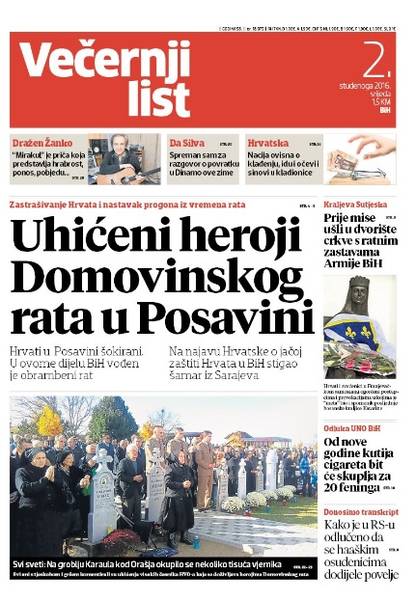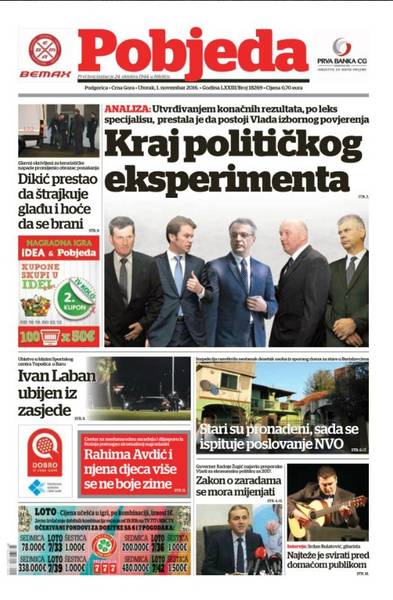Bosnia Slapped Croatia in the Face
Adelina Marini, November 2, 2016
 The policy of the new Croatian government regarding Bosnia and Herzegovina got a resounding slap in the face from Sarajevo just two days after the first official visit of Prime Minister Andrej Plenković abroad (to BiH), commented Croatian media. On Monday, two days after the return of the Croatian delegation from BiH, a dozen veterans from the Croatian army (BiH) got arrested in Orašje on charges in war crimes. Minister of Foreign Affairs Davor Ivo Stier and Minister of Defence Damir Krstičević expressed their concern regarding the incident. Jutarnji list and many other media today quote the Facebook status of former Minister of Defence Ante Kotromanović, who asks what were Andrej Plenković and Davor Ivo Stier doing in BiH during the two days of their visit.
The policy of the new Croatian government regarding Bosnia and Herzegovina got a resounding slap in the face from Sarajevo just two days after the first official visit of Prime Minister Andrej Plenković abroad (to BiH), commented Croatian media. On Monday, two days after the return of the Croatian delegation from BiH, a dozen veterans from the Croatian army (BiH) got arrested in Orašje on charges in war crimes. Minister of Foreign Affairs Davor Ivo Stier and Minister of Defence Damir Krstičević expressed their concern regarding the incident. Jutarnji list and many other media today quote the Facebook status of former Minister of Defence Ante Kotromanović, who asks what were Andrej Plenković and Davor Ivo Stier doing in BiH during the two days of their visit.
According to the weekly political magazine Globus, which comes out every Wednesday, the apprehension of the dozen veterans is a message to Andrej Plenković. The magazine quotes Željko Šiljeg, colonel general from the Croatian Defence Council. The purpose of the arrests was showing that Herceg-Bosna is a criminal creation. Globus comments that the arrests could develop into an extremely awkward and even explosive subject between Croatia and BiH, similar to the subject of the Serbian law for universal jurisdiction, because of which many Croatian veterans are trembling when they cross the border. Vecernji list reports from Orašje, that veterans there are afraid of the possibility that all of them might get arrested. “Any initiative for changes in BiH will be met with serious resistance due to the existence of different interests – from global to private, like keeping certain functions”, reports the newspaper.
Vecernji comments that the arrests come just two days after the visit of Andrej Plenković, where he advocated for a change in the election code that would allow Croats to elect their representatives. Arrests also come a day after the interview of President Bakir Izetbegović, in which he states that the threat to Croats in BiH is a mantra. In a commentary for the Bosnian edition of Vecernji list, Davor Ivanković writes that the arrests are Sarajevo’s reply to the previous Croatian policy of keeping arms crossed regarding BiH and the status of Croats there. The new Croatian policy aims for significant corrections and a return to Dayton in order to secure equal rights for Croats.
The operation against Croatian veterans is a warning that Sarajevo does not acknowledge Croatian arguments for the fact that the Croatian people there are under threat, further writes Davor Ivanković. In his opinion, the choosing of Orašje, which is regarded as the place with the mildest war crimes, could only be a signal for what else will follow – new campaigns for the apprehension of Croats. It is high time that Zagreb initialises a bilateral solution to the problem with charges against veterans, which has been frozen for 20 years. These (sometimes not raised on purpose) charges serve as political pressure, claims the author. The subject is almost nonexistent in the Bosnian media environment.
Not a single day without drama in Serbia
The “Jajinci” case continues to develop in a familiar direction. Minister of Labour Aleksandar Vulin, who is regarded as Prime Minister Vučić's mouthpiece on sensitive subjects, directly accused the US embassy in Belgrade in standing behind the assassination attempt. State television channel RTS quotes Mr Vulin, who claims to be speaking in private capacity and not having harmonised his opinion with the PM. “The ‘Jajinci’ case began in the night of the elections, when things got to the forceful entry of all parties in the Republic Electoral Commission in an attempt at changing the election results and their later visit to the American ambassador Kyle Scott”, said Vulin in an interview for the TV channel. The diplomat refused to comment Vulin’s appearances. “I saw Vulin’s statement and I am simply at loss for words in which to express myself. I think this statement is excessive and it would be better to concentrate on the fact that our relations are good and correct”, said Ambassador Scott, quoted by Tanjug.
Interior Minister Nebojša Stefanović in turn reported that the prime minister is worried that the target of the weapons discovered close to his family home was his brother Andrej. Blic reports that the PM did not show for work today. All his meetings were cancelled. Sources of the newspaper admitted that this is surprising. It is not clear whether his absence is somehow connected to the current security crisis, but it is unprecedented.
In a commentary for Politika, the editor-in-chief of the “New Serbian Political Thought” magazine and Member of Parliament Đorđe Vukadinović writes that the situation in Serbia is like in the lying shepherd story. "The only thing that remains unclear is whether recent developments in Serbia is already the true showing of the wolf, or it is one more play of the irresponsible and frivolous shepherd boys?”, asks the author. He places several other questions: was this really an attempt at the prime minister’s life; could this be a warning from some powerful external and internal factors; or is this again just a smoke screen, directed by the government itself because of ongoing cleansing operations in the security agency and military agencies? Whatever the answer, the situation is extremely serious, he believes.
"Optimists, and those, who persist in closing their eyes for the authoritarian nature of the current political regime, will interpret this as an encouragement signal, meaning a proof that here, see, Vučić turns out to be much better, much more careful and reasonable than his aides. This, however, is dubious consolation. In the end of the day, is there anyone, who seriously believes that Vulin, Stefanović, Dačić, Mihajlović, Palma, and the rest have all of a sudden started playing solo on such an important issue?”, continues his questions Đorđe Vukadinović. He goes on with the question what are regular people thinking or the myriad of foreign investors, whom Vučić is inviting to invest in Serbia, about a state, where someone is constantly preparing a state coup and/or the assassination of the prime minister.
Time for analyses in Montenegro
 While the formation of the new government in Montenegro is expected, media continue their analyses of the elections. Pobjeda prints at its title page an analysis by Nenad Zečević, who believes that the experiment of a government of electoral trust is over. This government (with participation by the opposition) was established with the goal of regaining trust in the electoral process and finding proof for misappropriation of state funds. He sends sharp criticism towards the opposition for not making any of that happen. The government of electoral trust was hailed by MEPs during the hearing of Montenegro PM Milo Đukanović prior to the elections.
While the formation of the new government in Montenegro is expected, media continue their analyses of the elections. Pobjeda prints at its title page an analysis by Nenad Zečević, who believes that the experiment of a government of electoral trust is over. This government (with participation by the opposition) was established with the goal of regaining trust in the electoral process and finding proof for misappropriation of state funds. He sends sharp criticism towards the opposition for not making any of that happen. The government of electoral trust was hailed by MEPs during the hearing of Montenegro PM Milo Đukanović prior to the elections.
First of all the opposition, led by the Democratic front, not only refused to recognise the elections, but also signed a document, with which it committed not to accept the results. Opposition members in the government failed to find a single case of misappropriation of state funds, continues the author, refuting claims from the opposition that the apprehension of Serbian nationals on charges of preparing terrorist attacks has influenced electoral activity and the election results. According to Nenad Zečević, the explanation is absurd for electoral activity was record-breaking high – 73%.
Political agony in Macedonia
With elections in Macedonia approaching on December 11, frustration in society with the ongoing and endless scandals there keeps growing. In a commentary for Utrinski vesnik, Tatiana Popovska writes that the prolonged political crisis has brought to surface the greediness, inhumanity, and impertinence of certain politicians. Political shuffles, subversive accusations, and scheming from the last few days are the biggest political agony, which is developing before the elections, and most probably after them as well, writes Popovska. “At the Macedonian scene it is no longer known who is backing what, who is against whom in the electoral race, and who works for whom”, she continues. At the moment the cleanest positions are held by VMRO-DPMNE and SDSM, for the former is trying to stay in power, and the latter is trying to take it.
Translated by Stanimir Stoev
 Bakir Izetbegovic, Andrej Plenkovic | © Council of the EU
Bakir Izetbegovic, Andrej Plenkovic | © Council of the EU Aleksandar Vucic, Recep Tayyip Erdogan | © Serbian Presidency
Aleksandar Vucic, Recep Tayyip Erdogan | © Serbian Presidency Jean-Claude Juncker, Zoran Zaev | © European Commission
Jean-Claude Juncker, Zoran Zaev | © European Commission